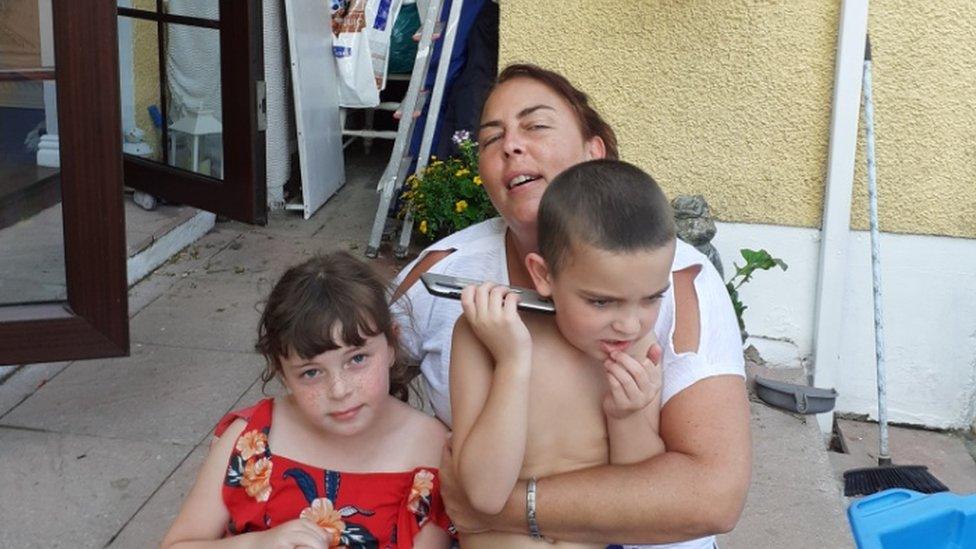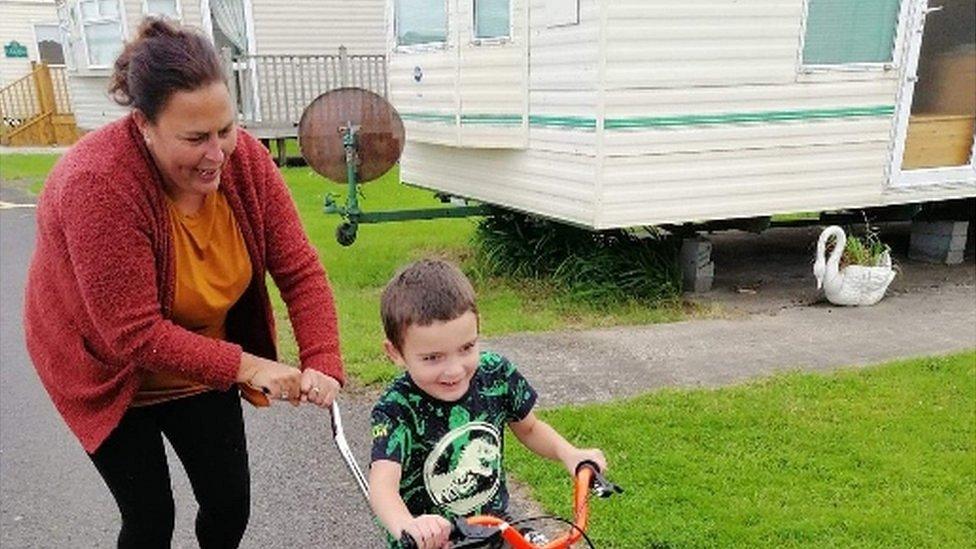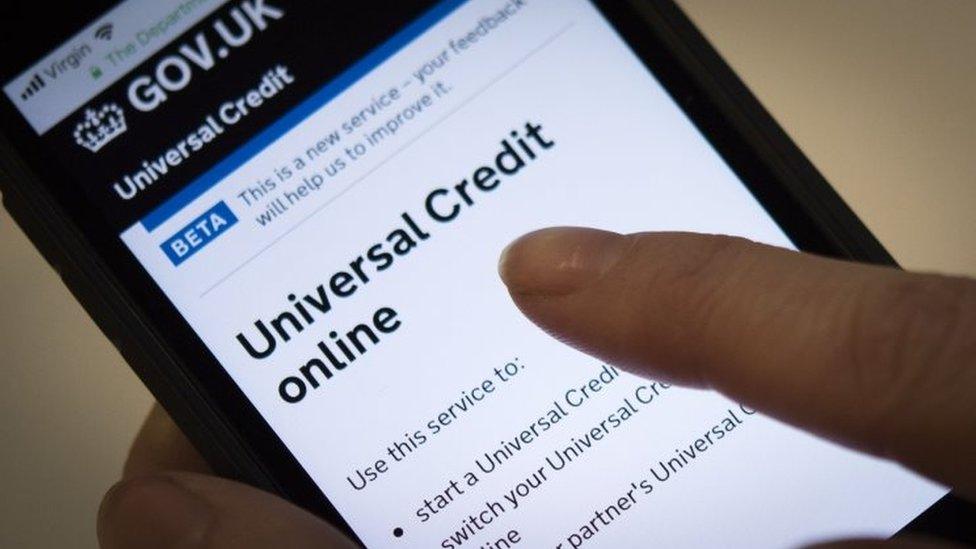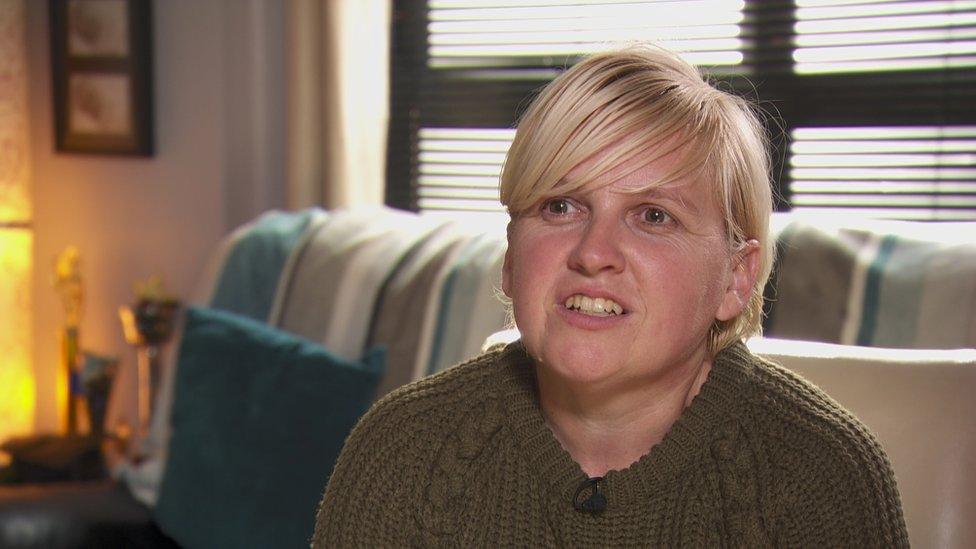Universal Credit: Hundreds of tenants in debt due to admin error
- Published

Maria Thompson did not realise money for her rent had been paid into her bank account
An error over universal credit (UC) has left hundreds of Housing Executive tenants with rent arrears totalling £296,000.
More than 650 tenants are affected, because money was sent to them instead of landlords, meaning it was spent before some realised.
NI's system is meant to pay the rent directly to landlords.
The Department for Communities says UC statements now provide a breakdown of the amount of housing support.
Those statements also indicate whether or not it has been paid to a landlord.
The department, which oversees welfare support, says it is working with claimants and landlords to ensure direct payments are made as early as possible.
The Housing Executive, which is Northern Ireland's largest social housing landlord, said the majority of the 662 cases now had subsequent payments made to it directly.
A spokesman said: "A strategic solution is being developed by the department which will ensure payments relating to housing costs will be made to landlords by default going forward."
Manual process
The numbers affected represents 4.5% of Housing Executive tenants in receipt of Universal Credit, and it covers a period from when it was introduced in September 2017, up to the start of July 2020.
Housing benefits are paid through the Universal Credit system.
Unlike some other parts of the UK, benefits for housing are meant to be paid directly to landlords in Northern Ireland.
However, it is understood the system in Northern Ireland is set to a default design to pay the housing costs to the claimant, in line with England and Wales.
BBC News NI understands there is a manual process in place to divert the money to a claimant's landlord instead.

Maria's story

Single mother-of-two Maria Thompson said she moved on to Universal Credit when lost her job in 2018.
"I got letters from the Housing Executive stating that my rent hadn't been paid and that I was 12 weeks in arrears. I couldn't understand why," she said.
The 37-year-old is the sole carer for her six-year-old son, John, who has chronic kidney disease and low-functioning autism.
Ms Thompson said prior to receiving Universal Credit, she had received housing benefit, which had always been paid directly to the Housing Executive.
She said the information provided to her about Universal Credit was not clear.
"There was no breakdown. There was no saying, 'this is for this or this is for that'.
"At the start I had £1,800 of rent arrears which I've now got down to £1,400 because I have to pay £30 a month directly from my Universal Credit to try and chip away at the rent arrears.
"I can't believe I've ended up in this situation. How can a benefit put you into so much debt?"

Alliance assembly member Kellie Armstrong, vice-chair of Stormont's communities committee, says the issue should form part of a review into welfare reform mitigations.
Six housing associations, which also provide social housing in Northern Ireland, said their tenants had also been affected.

Universal Credit was first introduced in Northern Ireland in September 2017 and replaced six benefits
Clanmil Housing Association's senior money adviser Eddie Smith said the level of its rent arrears increased after Universal Credit was introduced.
He said the issue of housing costs being paid to tenants instead of landlords has improved since March this year.
Connswater Homes, Newington Housing Association and St Matthew's Housing Association said they had experienced the problem while Woodvale & Shankill Community Housing Association said about 2% of its tenants who claim UC have been affected.
Patrick Thompson, deputy chief executive of the Northern Ireland Federation of Housing Associations, encouraged "claimants to keep a close eye on their payments".
"We urge them to speak to their housing association as soon as they can, if they think their housing costs haven't been paid," he said.
'I didn't understand'
The error has also affected private tenants.
Paul Moore, a self-employed artist who supplements his income with Universal Credit, asked that his housing costs be paid directly to his landlord.
The 42-year-old from east Belfast was contacted by his landlord in April this year to say he owed six months of rent, which is about £2,500.
"They'd stopped paying the money to the landlord," he said.
"They hadn't told me - or I hadn't understood - that I'd have to pay the money myself. I wasn't receiving enough money to supplement the rent."
- Published7 December 2019

- Published8 October 2019
